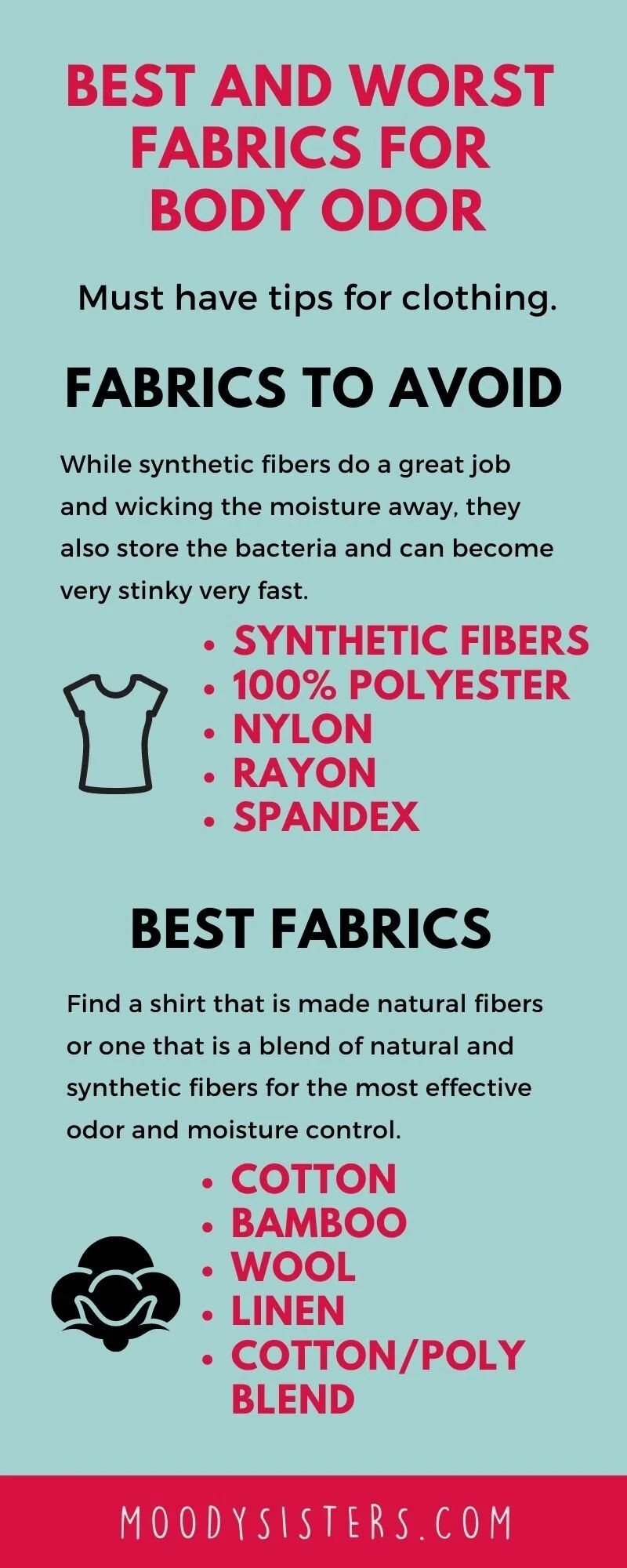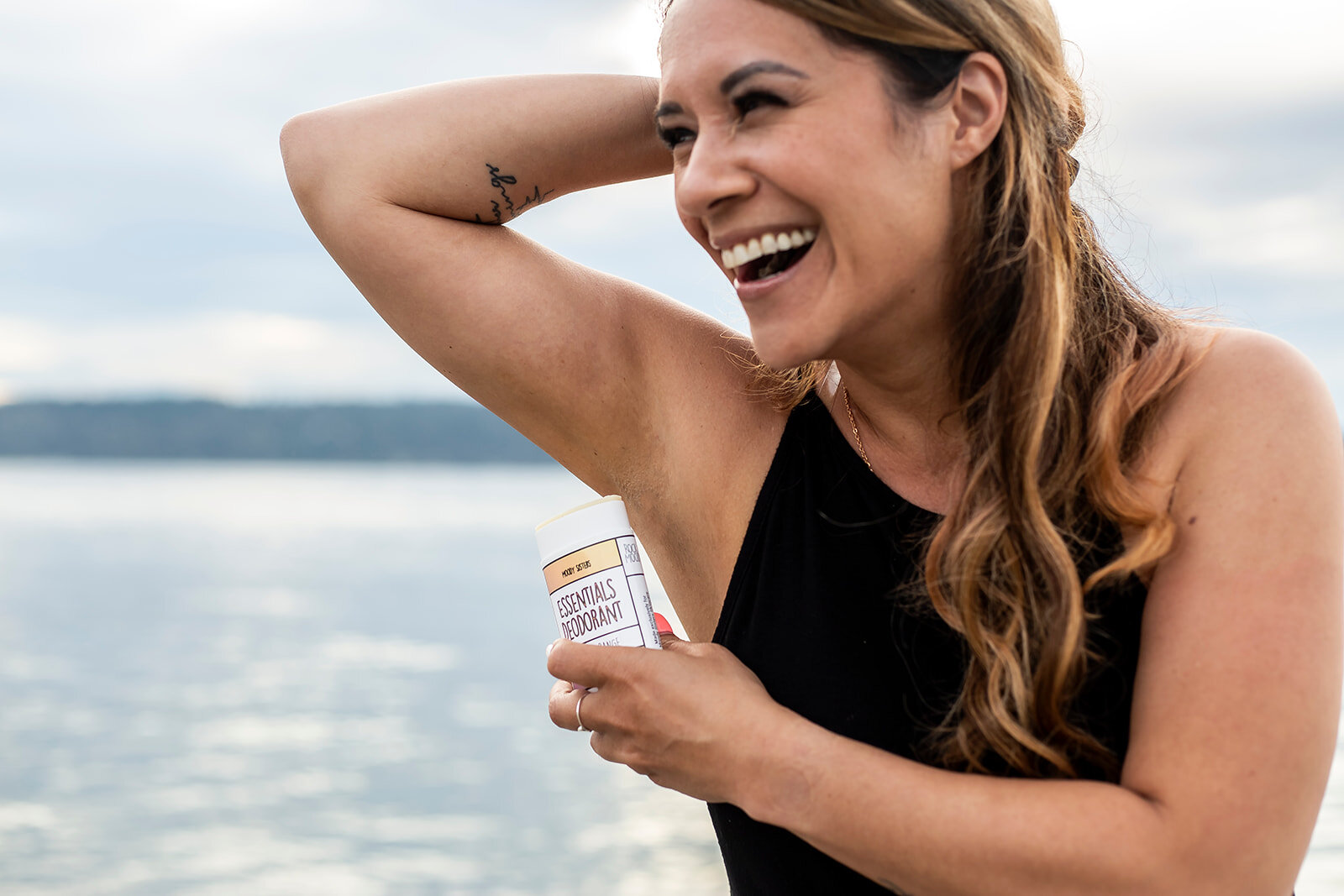You've made the switch to natural deodorant, but you may not have been prepared for the sweat. SO. MUCH. SWEAT. You may have been surprised at how much you've sweat.
Fear not, it's not all doom, gloom, and stink! All that sweat doesn't mean your natural deodorant isn't working, so hang in there during this phase! There are ways to work with all the sweat you've got going on as you first transition from an icky commercial deodorant to a natural deodorant.
You can help keep the odors away and stay drier for longer all while avoiding chemicals and using natural deodorant. It all starts in your closet!
Have you ever noticed that some shirts hold on to your body odor? Or maybe you are wondering, “Why do I smell so bad today?!”. It could simply be that your sweat and fabric are not jiving, and it’s not your deodorant's fault.
The fabric you're wearing on a daily basis can help you or hurt you, so it's time to put a little more thought into what clothes are touching your skin.

Clothing Fabrics Matter
It turns out your clothing matters more than you thought. Synthetic fibers that are so awesome at wicking moisture away from your body do a great job of pulling it all in for a little bacteria orgy. In fact, you may find that your synthetic fiber shirts smell before even putting them on from your last wear. They love to hold bacteria parties that stay forever and make your armpits a stink hole.
You may be thinking - uhh, why does that happen? The way it works is that synthetic fibers are so tightly woven that your sweat can't escape! It stays close to your skin and in your pits. The sweat alone won't make you smell - but bacteria that's on your skin naturally LOVE moisture and this is what is making your pits stink. When the sweat on your skin sticks around and doesn't dry out, that gives the bacteria chilling in your pits the chance to multiply and cause your body odor.

Tips for Preventing Odor in Shirts
In general, to prevent body odor, we have to make sure our skin, including our pits, stays clean and dry. This just isn't going to happen with synthetic fibers. Synthetic fibers don't absorb any moisture, leaving it to accumulate in your pits.
If synthetic fibers are sooo bad, why do we use them?
A lot of synthetic fibers are hydrophobic, meaning they repel moisture. Sometimes people wear them when they know they are going to sweat a lot because they don't want to get that sweat into their clothing, but little do they know they are stinking up their clothing instead.
Body odor can be hard to get out of your clothing. On the other hand, I know pit stains can be an eyesore but that can go away with one wash. Body odor sometimes lingers in clothing even AFTER a wash.
Here are some fabrics you should avoid if want to help keep yourself stink-free while using natural deodorant - or just in general.
Fabrics to Avoid:
· Synthetic Fibers
· 100% Polyester
· Nylon
· Rayon
· Spandex
So what's the fabric alternative? Natural Fibers. You're probably familiar with them already and if you're like me, you already have natural fiber clothing in your closet. Familiar fabrics such as cotton, linen, and bamboo are natural and they are breathable and breezy!
While it may take natural fabrics a bit more time to dry, natural fibers don't hold on to smell like synthetic fibers do. This is because the fabric is breathable and lets moisture get away from the skin. These fabrics will also absorb some of your moisture. The goal is to keep your skin free of any wetness because only there will the bacteria get to multiply.
Probably the biggest pro is they are not a good environment for bacteria. Bacteria don't get the chance to hang around the moisture they love so much. No bacteria orgies here! I've noticed that since I have made the switch, piece by piece, to natural fibers, the difference has been significant. I sweat less and stink less! Begone, stinky clothes!
Here are the fabrics I KNOW stop the stink - and they are comfortable too!

Best Fabrics for Body Odor:
· Cotton
· Bamboo
· Wool
· Linen
Something I’ve noticed is that blends work well too . You don't have to wear 100% linen to get all the benefits of it. I've noticed that there are some natural fibers that are blended with synthetic fibers that get the job done well. Think of it as blending the best of both worlds (as Hannah Montana would say - what a sage).
With a blend, you get the breathability of natural fibers and the moisture repelling benefits of synthetic fibers like polyester. For example, a lot of work out clothing is made from polyester/cotton blends. No one wants to stink up a storm at their yoga class!
Just like anything in life, synthetic just isn't as good as anything natural. Gotta keep things natural so that everything can vibe with one another.
Synthetic fibers are good in a blend-- but on their own, they trap in sweat and cause the bacteria chillin' in our pits to grow, grow, grow!
Those bacteria are the ones responsible for our body odor. That body odor will be there regardless of whether we are wearing natural deodorant or not. Smelling a little funky is a natural part of life anyway! All we can do is find ways around it and prevent it from happening.

The Take Away
If you need cute clothing made of all the good fabrics search for organic handmade tees and you’ll find cotton/poly blend that is insanely effective against sweat and super soft too! Don’t forget if you shop small you’ll be able to support a small business that advocates for social justice causes such as equality and environmental conservation. It's good to support good people and good causes!
All in all, don't let sweat stop you from feeling cute and comfortable. If you are in the middle of a deodorant detox, don't let this extra sweaty phase stop you from making the transition to a natural deodorant.
Once you make it past the excessive sweatiness that is cleansing your body, the amount of sweating you're doing will decrease and it'll be worth the transition - I promise! I made the switch and never looked back.
During the transition, I just made sure to wear breathable, natural fabric such as cotton and wool and it helped tremendously. Hang in there, girlfriend! Our journey to being our best, natural selves isn't over yet.
Featured
Why does my natural deodorant make me smell worse?
Is your natural deodorant making you more smelly? Here’s what could be going wrong and how you can find the right deodorant for you!
The Best Fabrics for Body Odor
Fear not, it’s not all doom, gloom and stink. There are ways to help keep the odors down and stay dryer longer and it all starts in your closet.
How to Switch to Natural Deodorant [5 Important Tips]
Here are our top 5 tips and suggestions when making the transition from commercial anti-antiperspirant deodorants to natural aluminum and chemical free ones.
5 Natural Must Have Tips to Tackle Your Boob Sweat
See our must have natural tips on how you can tackle boob sweat with these easy and practical tips.
Share this Moody Guide with a friend!
Deodorant
Whitney Acheson
Sweat, Body Odor
As someone deeply immersed in the world of natural deodorants and the intricacies of making the switch from commercial to natural alternatives, I can provide valuable insights into the nuances of this transition. My expertise stems from extensive research, personal experience, and a genuine passion for advocating for healthier lifestyle choices.
Now, let's delve into the concepts mentioned in the article:
1. Transitioning to Natural Deodorant: The article recognizes the challenges individuals face when transitioning from conventional deodorants to natural ones. The increased sweat during this phase is acknowledged as a normal part of the detox process, reassuring readers that it doesn't indicate the natural deodorant's ineffectiveness.
2. The Impact of Clothing Fabrics: An intriguing aspect highlighted is the influence of clothing fabrics on body odor. Synthetic fibers, though efficient in wicking moisture away, create an environment conducive to bacterial growth, leading to persistent odors. The article suggests that the choice of fabric can either enhance or hinder the effectiveness of natural deodorants.
3. Synthetic vs. Natural Fabrics: Synthetic fibers, including Polyester, Nylon, Rayon, and Spandex, are identified as problematic due to their moisture-trapping nature. In contrast, natural fibers like Cotton, Bamboo, Wool, and Linen are recommended for their breathability and moisture-absorbing properties. The article emphasizes that natural fabrics prevent the accumulation of moisture, reducing the chances of bacterial proliferation and unpleasant body odors.
4. Blends for Optimal Performance: The article introduces the concept of fabric blends, combining natural and synthetic fibers for optimal performance. This hybrid approach aims to capitalize on the breathability of natural fibers while leveraging the moisture-repelling benefits of synthetics. The effectiveness of polyester/cotton blends in workout clothing is cited as an example.
5. Best Fabrics for Body Odor Prevention: A list of fabrics known to prevent body odor is provided, including Cotton, Bamboo, Wool, and Linen. The author shares personal experiences, noting a significant reduction in sweating and odor after transitioning to natural fibers.
6. Supporting Small Businesses: The article concludes with a call to support small businesses, specifically those offering organic handmade tees with cotton/poly blends that are effective against sweat. This aligns with values of social justice and environmental conservation.
7. Deodorant Transition Tips: References to other articles within the content suggest a broader coverage of related topics, such as "How to Switch to Natural Deodorant [5 Important Tips]" and "Is your natural deodorant making you more smelly?" These articles likely provide additional tips and insights into the natural deodorant transition process.
In summary, the article not only addresses the challenges of transitioning to natural deodorants but also underscores the crucial role clothing fabrics play in managing body odor. The emphasis on natural fibers and the consideration of fabric blends showcase a nuanced understanding of the subject matter.